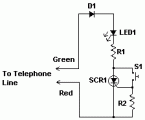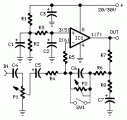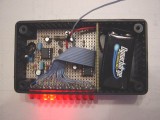FREE
circuits!
Recently added diagrams and projects

July 2, 2010
The Link circuitry is simple and efficient, employing just two ICs, half a dozen transistors, and a handful of garden variety components. It all runs on 12 volts and is easily assembled. You can have... [more]

July 2, 2010
the Link Telephone Intercom - DTMF version [more]

July 2, 2010
This version of the Link is for those who really need a good cheap intercom that will work reliably, but without access to an outside Telco line. This could be in a pre school, a... [more]

July 2, 2010
The circuit you are about to see is the culmination of some effort at improving the basic Link intercom design. You may think that pulse dialing is 'old hat' nowadays, but the exercise of building... [more]

July 2, 2010
Once power has been applied to the circuit, the Red LEDs should all be flashing on and off together. The Yellow LEDs should be flashing on and off, but only every other Yellow LED should... [more]

July 2, 2010
Although a hold feature is standard on most new phones, a lot of us still use the origional bell phones. Those of us that require a hold feature will find this circuit very useful. It... [more]

July 2, 2010
This preamplifier was designed to cope with CD players, tuners, tape recorders etc., providing a gain of 4, in order to drive less sensitive power amplifiers. As modern Hi-Fi home equipment is frequently fitted with... [more]

July 2, 2010
This project uses an LM3915 bar-graph IC driving two sets of ten LEDs for a 30dB range. The circuit is unique because it has an additional range of 20dB provided by an automatic gain control... [more]

July 2, 2010
This is a fun and useful circuit for demonstrating high frequency high voltge. It can produce up to about 30KV, depending on the transformer used. It is cheap and easy to make, thanks to the... [more]










 All posts
All posts